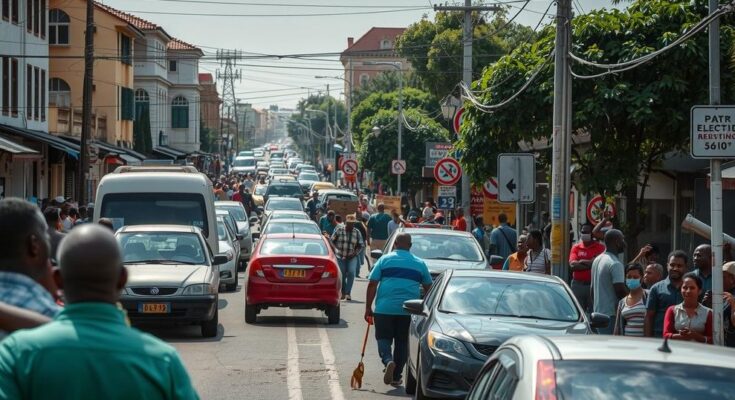Mozambique faces unprecedented unrest as major cities erupt in violence following the disputed results of the October presidential elections. The ruling Frelimo party’s affirmation by the Constitutional Council has led to protests, looting, and significant disruptions in daily life. With over 240 fatalities reported amid clashes, the need for dialogue and peaceful resolution has become paramount, as highlighted by local leaders and international observers, including the UN Secretary-General.
Significant unrest has gripped major cities in Mozambique, including the capital, Maputo, following contentious results from the October presidential elections. The confirmed victory of the ruling Frelimo party led to widespread demonstrations, characterized by violence, vandalism, and looting, leaving many businesses, such as banks, closed and halting both transportation and trading activities. The unrest intensified after the Constitutional Council declared that Frelimo’s candidate, Daniel Chapo, secured 65% of the vote, a reduction from initial estimates of nearly 71%.
Protests erupted immediately, leading to clashes with law enforcement, destruction of property, and tragic incidents, including the deaths of at least 248 people amid ongoing violence. A resident in the Praca dos Combatentes neighborhood recounted seeing looters stealing various household items, expressing deep concern over the chaos. As the situation escalated, police chief Bernardino Rafael condemned the violence, labeling the actions of rioters as criminal attempts to disrupt order in the Matola industrial area.
Venancio Mondlane, leader of the opposition, accused the police of inciting violence and urged his supporters to continue peaceful protests. He raised serious allegations of election fraud and called for accountability, declaring his intention to assume the presidency on January 15. Meanwhile, the United Nations has voiced alarm over these developments, with Secretary-General Antonio Guterres emphasizing the need for dialogue among political factions to de-escalate tensions and avoid further loss of life.
In light of the unfolding turmoil, it remains imperative for all stakeholders in Mozambique to pursue peaceful solutions to restore stability and foster a constructive political environment to address the citizens’ grievances and aspirations for democratic governance.
The unrest in Mozambique can be traced back to the deeply contentious results of the October presidential elections, which saw the ruling Frelimo party maintain its long-standing hold on power. Following the announcement by the Constitutional Council affirming Frelimo’s victory, public discontent boiled over into protests, leading to chaos in several urban areas. Historically, Frelimo has ruled Mozambique since its independence in 1975, making it essential to understand the political dynamics and opposition sentiment that have sparked the current crisis.
In conclusion, Mozambique is currently experiencing severe unrest as protests against the electoral results escalate into violence, triggering significant human and economic consequences. As frustration grows among the population regarding the long-standing rule of the Frelimo party, the calls for dialogue and peaceful resolution from both the opposition and international bodies underscore the urgent need for a collective effort to restore order and address the issues at hand. The prevailing situation not only threatens immediate safety but also has profound implications for the nation’s democratic processes moving forward.
Original Source: www.dw.com




